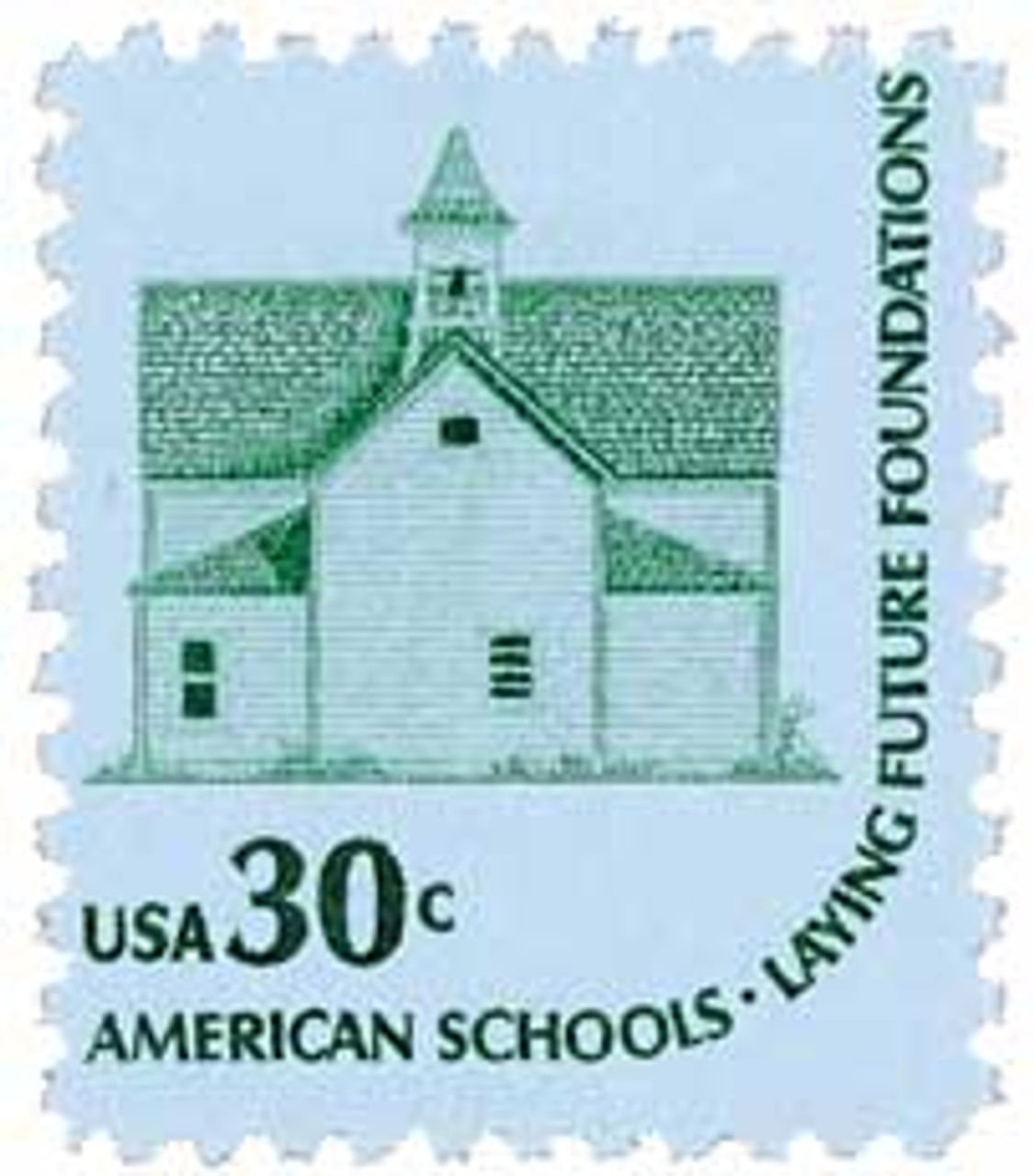
U.S. #1606
1979 30¢ Morris Township Schoolhouse
Americana Series
Issue Date: August 27, 1979
City: Devils Lake, ND
Printed By: Bureau of Engraving and Printing
Printing Method: Engraved
Perforation: 11 x 10 ½
Color:&... more
U.S. #1606
1979 30¢ Morris Township Schoolhouse
Americana Series
Issue Date: August 27, 1979
City: Devils Lake, ND
Printed By: Bureau of Engraving and Printing
Printing Method: Engraved
Perforation: 11 x 10 ½
Color: Green
Mary Antin described education as “the essence of American opportunity, the treasure that no thief could touch, not even misfortune or poverty.” Since 1635, when the first town-supported school was established, America’s public education system has come a long way.
The 30¢ Schoolhouse stamp pictures Morris Township School No. 2 in Devil's Lake, North Dakota. The school was in used from 1894 to 1960 and has since served as the Morris Town Hall.
Birth of Horace Mann
Horace Mann was born on May 4, 1796, in Franklin, Massachusetts. Mann was a pioneering educational reformer who improved public education in his home state. Many of his ideas were quickly adopted by several other states.
Mann’s schooling was infrequent as a child. Between the ages of 10 and 20, he never had more than a couple months’ worth of schooling in any given year. However, he was a frequent visitor to the Franklin Public Library, one of the first public libraries in the country. He went to Brown University when he was 20, graduating as valedictorian after three years. Mann went on to work as a librarian and tutor of Latin and Greek before being admitted to the bar in 1823.
Elected to the Massachusetts state legislature in 1827, Mann supported education reform and public charities. He served on the committee that revised the state statutes and provided several changes that were ultimately adopted. Mann also opened an asylum in Worcester and served on its board of trustees. After moving to Boston, Mann was elected to the Massachusetts State Senate. He was the senate president for a year and pushed for the building of railroads and canals.
After Mann was made secretary of the new Massachusetts Board of Education in 1837, he resigned from all his other posts to focus his attention on this work. Mann worked tirelessly at educational reform. He held teachers’ conventions and presented his ideas at lectures around the state. In fact, he visited every school in the state so he could see what was and wasn’t working. Mann also developed the Massachusetts normal school system. This was a system that trained high school graduates to become teachers. He also introduced a series of annual reports that are considered one of the best “expositions… of the practical benefits of a common school education both to the individual and to the state.” Additionally, Mann discouraged the use of physical punishment in school discipline.
Mann founded The Common School Journal in 1838, which explored public schools and their issues. He had six main principles regarding education: the public could no longer be ignorant of it, education should be paid for and nurtured by the public, that schools include children from a variety of backgrounds, education should be non-sectarian, it should be taught on the tenets of a free society, and it should be taught by well-trained teachers. In 1843, Mann personally paid for a research trip to Europe to study how other schools operated, especially in Prussia. He published his results in his journal, which was widely circulated in the US and England.
Mann believed children from all classes should study together, so they could enjoy a common learning experience and the less fortunate could have a better chance at success. Mann also believed school could help provide discipline by encouraging prompt attendance and time management. While some opposed his reforms, they were widely accepted across Massachusetts and quickly spread to other states. Mann also pushed for women to become teachers.
Mann went on to serve in the US Congress from 1848 to 1853. In 1852, he was selected to serve as president of the new Antioch College in Yellow Springs, Ohio. While there, he taught economics, philosophy, and theology. He remained there until his death on August 2, 1859. Several schools and school buildings around the country have been named after Mann.


















